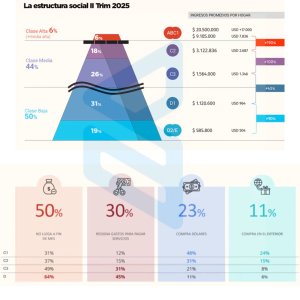earlyretirement
Moderator
🇦🇷🔺Argentine Social Pyramid Q2 2025: Key Findings
Income and Economic Situation
⛔️50% of Argentines live on less than $1,120,600 ($933 USD) per month, according to data from the Moiguer consulting firm for the second quarter of 2025.
⛔️Half of the population cannot make ends meet, highlighting severe budgetary constraints.
⛔️30% of Argentines admit they have had to give up basic necessities, reflecting the impact of inflation and the loss of purchasing power.
Contrasts and Polarization
⛔️23% of respondents report regularly buying US dollars, a practice linked to seeking protection against economic instability and the devaluation of the peso.
⛔️11% say they make purchases abroad, marking a significant gap compared to the majority who struggle to cover essential needs.
📣The Argentine social pyramid in the second quarter of 2025 shows marked polarization: while half the population lives with very limited income and struggles to make ends meet, a minority can access foreign currency and shop abroad. These figures reflect the impact of the economic crisis, inflation, and growing inequality in the country.

Income and Economic Situation
⛔️50% of Argentines live on less than $1,120,600 ($933 USD) per month, according to data from the Moiguer consulting firm for the second quarter of 2025.
⛔️Half of the population cannot make ends meet, highlighting severe budgetary constraints.
⛔️30% of Argentines admit they have had to give up basic necessities, reflecting the impact of inflation and the loss of purchasing power.
Contrasts and Polarization
⛔️23% of respondents report regularly buying US dollars, a practice linked to seeking protection against economic instability and the devaluation of the peso.
⛔️11% say they make purchases abroad, marking a significant gap compared to the majority who struggle to cover essential needs.
📣The Argentine social pyramid in the second quarter of 2025 shows marked polarization: while half the population lives with very limited income and struggles to make ends meet, a minority can access foreign currency and shop abroad. These figures reflect the impact of the economic crisis, inflation, and growing inequality in the country.


